LSE Library has been home to the Hall-Carpenter Archives since 1988. It’s an extensive collection of archives, ephemera and printed material documenting the development of gay activism in the UK since the 1950s. But how did it come to LSE and what does it hold? Curator Dr Gillian Murphy introduces the collection.
“Our memories matter. Past records matter.”
In many ways, the 1970s was a transformational time to be LGBT. The Sexual Offences Act (1967) had not long passed (decriminalising homosexual acts in private between men over 21) and LGBT interest groups were flourishing. One of these, inspired by the 1969 Stonewall riots in New York and first formed in a classroom at LSE, was the Gay Liberation Front (GLF). The GLF encouraged LGBT people to come out of the closet, organising the UK’s very first Pride march in London 1972.
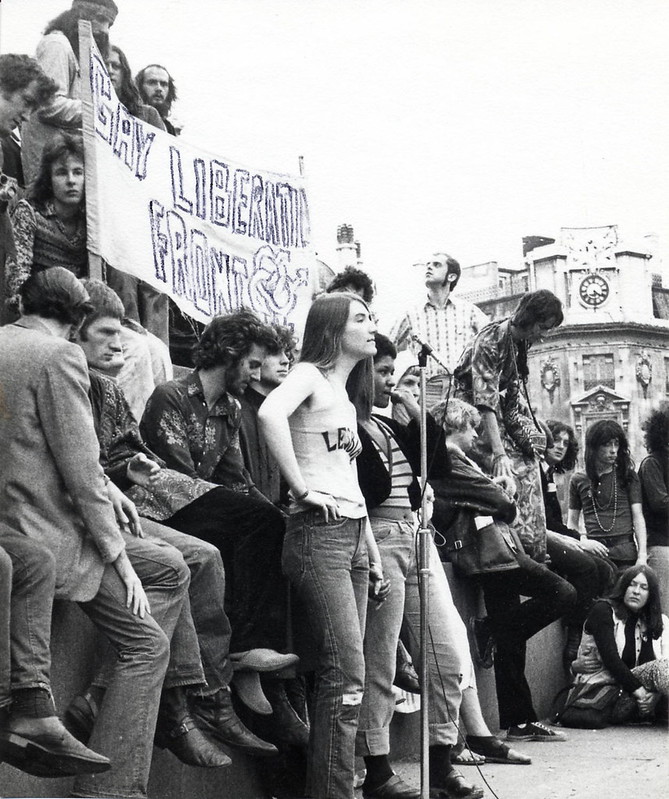
Many other LGBT groups emerged around this time, such as the London Gay Teenage Group, Gay Activists Alliance and the Lesbian and Gay Christian Movement, to name a few. Other groups, which had formed in the 1960s, such as the North-Western Homosexual Law Committee, renamed itself as the Campaign for Homosexual Equality (CHE).
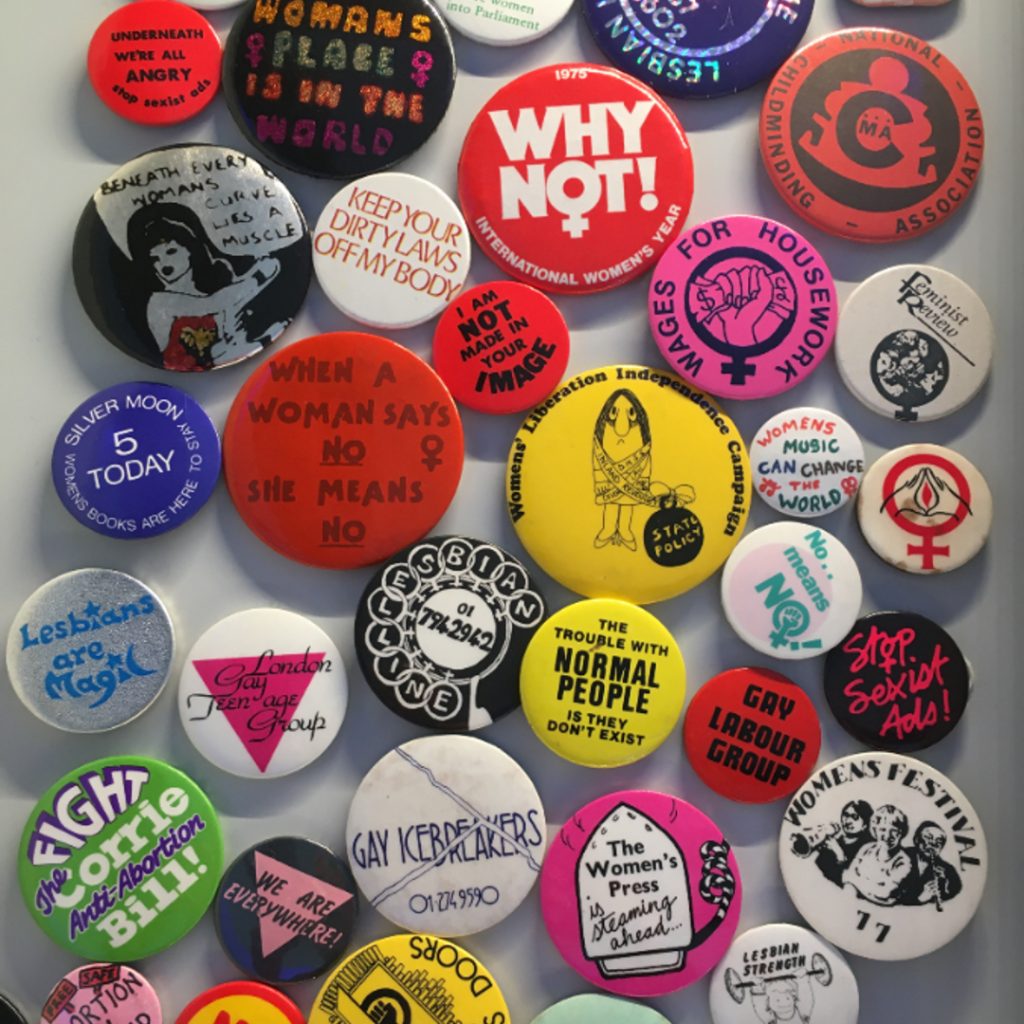
The idea of preserving LGBT history and providing a resource for researchers began in 1976 with the British Sociological Association’s Gay Research Group. First meetings were held at LSE, and you can see from their bulletin the progress they had made; issues they were discussing, and areas of research interest.

Unfortunately, more LGBT openness brought increased homophobia and discrimination. CHE set up a Commission on Discrimination and monitored cases of discrimination against LGBT people in all parts of life. This Commission collected evidence of discrimination in the media, and later began the Gay Monitoring and Archive Project in 1981. The project was sponsored by the National Council of Civil Liberties, now known as Liberty. CHE members sent press cuttings and related material on discrimination to CHE and slowly an archive began to grow.
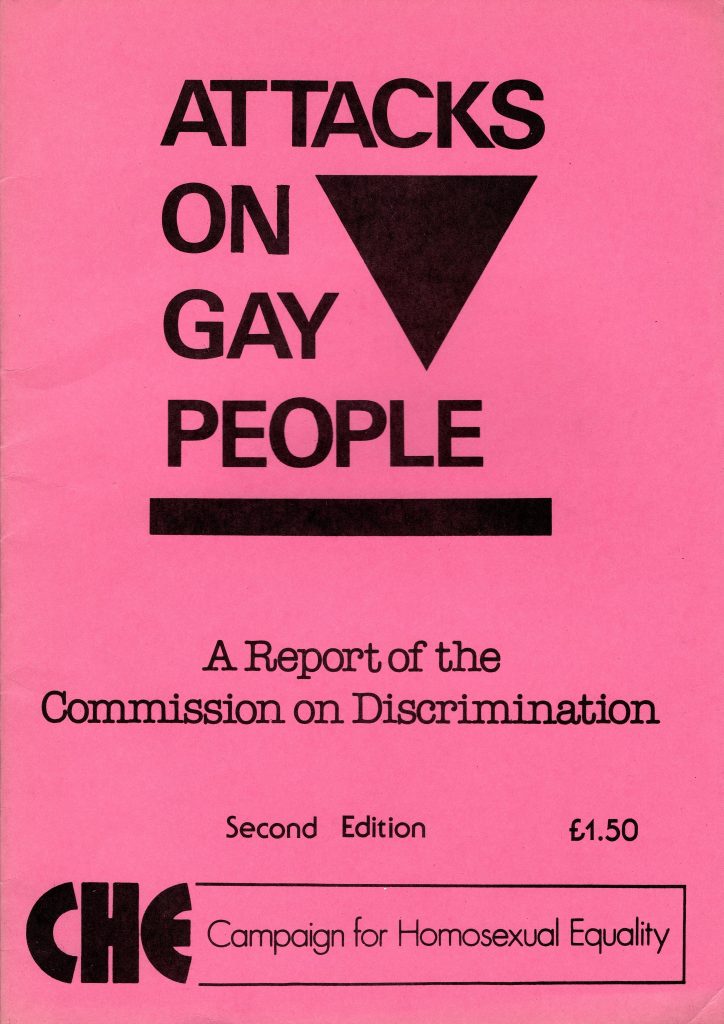
In order to achieve its goals, the Gay Monitoring and Archive Project needed to become a charity with a name. Suggestions ranged from the Monitoring and Archive Project, Sex Discrimination Archives to the Hall-Carpenter Archives. The latter was chosen.
The Hall-Carpenter Archives became a charity in 1982, named in honour of authors Radclyffe Hall and Edward Carpenter. It received a major grant from the Greater London Council (GLC) and came to be based at the London Lesbian and Gay Centre in Farringdon.
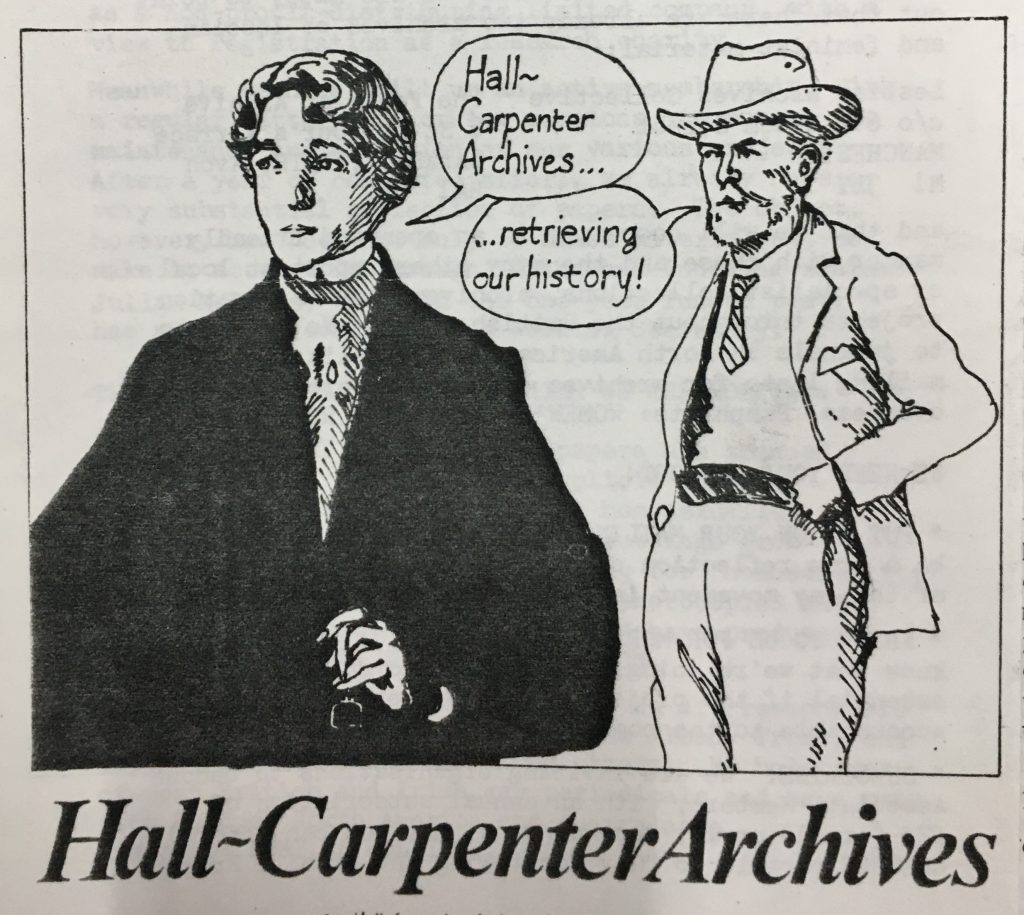
With the end of the GLC in 1986, major funding for the archive dried up. The Hall-Carpenter Archives now had to begin an appeal to find a new home and resources to survive. It was decided to split the collection into three: archives and magazines, press cuttings, and oral histories. In 1988, the archives, ephemera and runs of gay journals and magazines were transferred to LSE Library, and the oral history material was added to the British Library Sound Archive. The collection of now over 300,000 press cuttings became known as the Lesbian and Gay News media Archive (LAGNA) and found its home at the Bishopsgate Institute as part of their LGBTQ+ collection.
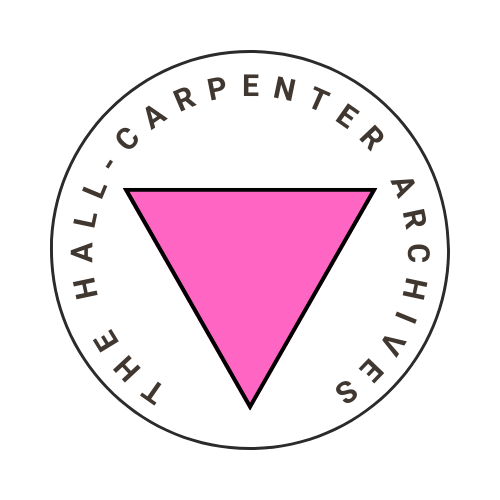
The Hall-Carpenter Archives at LSE has continued to grow and evolve over the years as interest in it and awareness of LGBT history has increased. We welcome all who wish to visit and use this unique and historically valuable resource.
Find out more
- Explore the collections through our LGBT highlight page
- Watch Dan Glass talk on the importance of the Hall-Carpenter Archives for LGBT history
- View LSE Library’s YouTube Hall-Carpenter Archives playlist
- Download schools resources: Campaigning for Change: LGBT+ Activism 1970s & 80s
- Browse our Hall-Carpenter Archives Flickr album
- Read Sue Donnelly’s article “Coming out in the archives”
How to access the Hall-Carpenter Archives
Book a visit and order material on our access archives and special collections page.
To search, use the archives catalogue typing HCA* into “Refno” field or select ‘Hall-Carpenter Archives’ in the Discrete Collections drop down of Advanced Search.
More on LGBTQ history
Browse our collection of blog posts about LGBTQ history at LSE.
Call for submissions
Are you researching LGBTQ history at LSE? Read our contributions policy then get in touch to submit your blog proposal.
Or are you interested in beginning a research project? Get started with LSE Library’s archive collections on LGBT history and LSE history.
Posts about LSE Library explore the history of the Library, our archives and special collections.
This article was originally posted on the LSE Library blog.


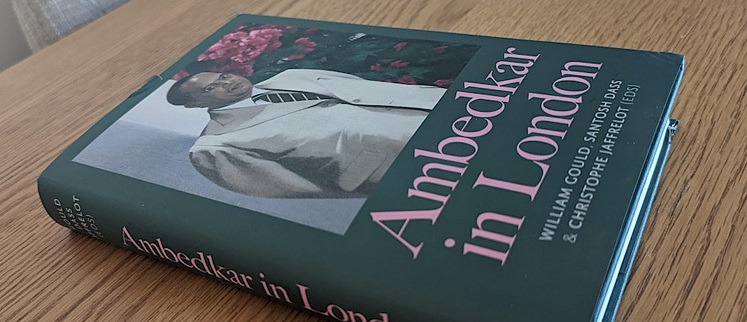


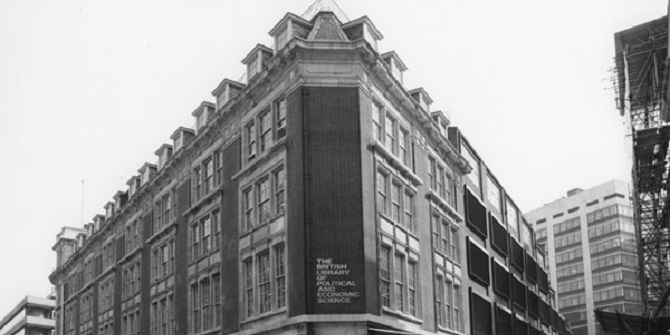
I have two files of notes about Services of Blessing for same sex couples I have taken since 1969. May I lodge them with you?
Thank you for your message, Malcolm. Our Archives and Special Collections Team will get in touch by email to follow this up with you. Hayley Reed, blog editor
Hi Hayley/Blog Editor – I came across this blog recently and find it a wonderful resource. I just wondered if you knew about the Gay Left site that was created about 10 years ago that has digital copies of the 10 issues of the Gay Left journal that was produced in London in the 1970’s. I was on that Collective in the early years and helped set up this website. You may have it, but I just can’t see it. Thank you.
http://www.gayleft1970s.org/
Best wishes, Gregg Blachford
Thanks Gregg! I will pass this on to our Library team. Hayley
I would like to give to the Hall Carpenter Archive a copy of a Limited Edition ” Seventy Haiku from Nigel for Nigel” A book I commissioned for Nigel Young’s 70th Birthday in June 2016 Nigel was a Student. @LSE 1967-1970 He was a member of The Gay Left Collective & LGSM I met Nigel on 1st April 1983 ‘All Fool’s Day’ outside Gay’s The Word about to board a Coach organised by “Gays For A Nuclear Free Future” to Join a Stand Together around Greenham Common, Aldermarston & Burghfield we have been Companions since that time up to the present day.
Would you accept such a book?
Thank you
Jonathan Blake
Hello and thank you for getting in touch. Our curator Gillian Murphy will contact you directly.
Hi – I have a bunch of LGBT magazines from the late 80s early 90s – some of which I can see are in the archive but not all the same issues as I have. Would you like them?
Hi Nicola and thank you very much for your message. Our curator will be happy to discuss this with you, please do email library.enquiries@lse.ac.uk. Hayley Reed, blog editor
I thought your readership might be interested in a new video about LGBTQ history. In consultation with members of the Lesbian Archives of Sonoma County, award-winning documentary filmmaker Eve Goldberg has produced a short video about a seminal event in the LGBTQ history of Sonoma County, California — the 1972 protest of a theater production of “The Killing of Sister George.”
Combining newly shot interviews with archival footage, this video is an example of how our history can be transformed into a contemporary teaching tool, how local LGBTQ history can come alive, and how we can create new opportunities for our elders to speak to people today.
A link to this 11 minute video is available here:
“Protesting Sister George”
https://www.youtube.com/watch?v=aQhDUJwdmQY&feature=youtu.be
Please feel free to share the video with your listservs, members, or other interested people.
Hope you enjoy the video!
Sincerely,
Eve Goldberg,
https://eve-goldberg.com/